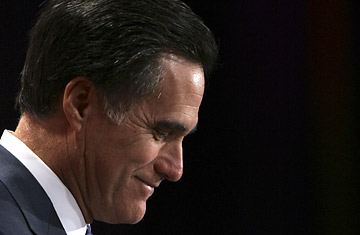
Republican presidential hopeful Mitt Romney pauses during his speech at the after caucus party in Des Moines, Iowa, Thursday, January 3, 2008.
Coming in nine points behind Mike Huckabee and over $40 million dollars poorer, Mitt Romney was introduced Thursday night in Iowa by Olympic gold medalist Dan Jansen. Romney's first words to the crowd exemplified the former Massachusetts governor's relentlessly sunny disposition: "Well, we won the silver."
That may be something to celebrate in the Olympics, which Romney famously turned around in Salt Lake. But throughout his presidential campaign, Romney has viewed business as a model for government, and in business, as in politics, there are no prizes for second place. In fact, his campaign refuses to characterize the Iowa Caucus results as a loss. "You have to remember, we started at zero," national spokesman Kevin Madden told the press. Romney "returned a good second place result. It's Washington that lost."
Romney echoed that sentiment in his concession speech. During his campaign, he said, voters complained to him, "Washington is broken and Iowa said that tonight. On the Democratic side, we have a new face, Barack Obama. And on our side, new contenders."
New contenders, but just as important, new voters. Throughout the state, massive attendance by scores of new voters, especially evangelical Christians, disrupted the Romney campaign's carefully calibrated strategy to conduct the political version of a leveraged buyout. And no matter how much of a positive spin the relentlessly chipper Romney campaign tries to put on it — Madden even said that, despite losing, they had "met our vote goal" — there is no denying that Romney finds himself on the ropes heading into next Tuesday's New Hampshire primary. With an already surging John McCain coming off a respectable showing in Iowa and Huckabee illustrating the limits of big money and organizational prowess, the consultant-in-chief faces a major challenge to his business plan.
Huckabee's convincing victory was as if Bain Capital had lost a takeover bid to George Bailey. For many at Romney's somewhat subdued "victory party," the idea that such a rational and well-researched plan could be upset by, as one woman put it, "a country sleaze" simply did not compute. Mitt Romney's concession was just being announced on CNN as precinct captains shook their heads. Some exclaimed, in the same polite sub-profanities that Romney might use: "Bull!" "Darn!" Somewhere, perhaps, even, "H-E-double hockey sticks!" Told that Fox News had just made a similar announcement, viewers were adamant: "Then Fox News needs to have its head examined!"
This is the exact opposite of blaming the victim; it's blaming the customer — because Romney and his staff insist that the product itself is not flawed. "Romney represents the best candidate to continue beyond Iowa," Madden explained, patiently re-iterating the national security/social conservistism/economic conservatism triad (the fabled "Reagan coalition") that are the core competencies of brand Romney. "I don't believe Mike Huckabee has positions that are going to appeal to voters in New Hampshire, Michigan and South Carolina." And as for the negative ads — against both Huckabee and John McCain — that seemed to bait an already energized evangelical base, those aren't going away either. "It is important to make a case about differences," said Madden, using the campaign patois for what civilians consider attacks.
The Romney camp's embrace of sports metaphors may have signaled a realization that they need to lower their own — and observers' — bar for success. Doug Gross, Romney's Iowa chairman, took the expectations game even further, recalling a past candidate who was "five states in before he won his first primary," and then went on to win the presidency. Romney accepted the silver with cool grace, but one wonders how well he would receive being compared to perennial GOP punching bag, Bill Clinton.
